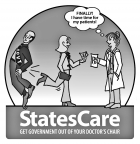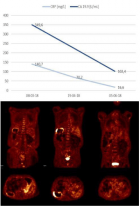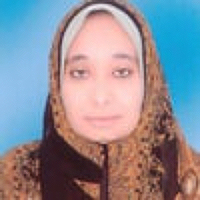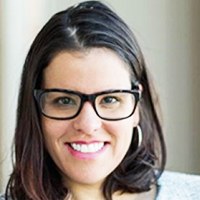Abstract
Research Article
Personal and academic factors of stress in nursing students during clinical practices in the context of COVID-19
Lester Fidel García Guzmán*, Dulce Maria Oviedo Martinez, Alexis Silva López and Makorre Wilson Mohochi
Published: 23 March, 2022 | Volume 6 - Issue 1 | Pages: 014-019
In the year 2020, COVID-19 spread globally. The increase in cases and deaths has created problems such as stress, anxiety, and depression in health workers.
The health care workers (inclusive of students in professional practices are vulnerable to psychiatric pathology due to their exposure to the virus, their increased risk of contagion and even death, overload of functions, pressure for decision-making, the close experience of patients, relatives, and colleagues’ pain, and the requirement to function at the top of capacity.
The objective of this research is to analyse the personal and academic factors of stress development in nursing students, during clinical practices in the COVID-19 context.
It is a cases and controls study, with 154 students who attended clinical practices during the period of May-August 2020. High levels of stress were found in 61% of students, 34 of these had difficulties concentrating (OR: 3.08), 64 participants reported fear of contact with COVID-19 patients, (OR: 1.9) and 68 participants were identified with inadequate knowledge of COVID-19 transmission (OR: 1.5).
The study found that the transition to virtual classes as a strategy to reduce contagion increases three times the possibilities of developing stress, another variable that doubles the risk of stress is the fear of caring for a patient with COVID-19 who has not been diagnosed.
Read Full Article HTML DOI: 10.29328/journal.cjncp.1001041 Cite this Article Read Full Article PDF
Keywords:
Stress; Personal factors; Academic factors; Clinical practices’ COVID-19
References
- Ozamiz-Etxebarria N, Dosil-Santamaria M, Picaza-Gorrochategui M, Idoiaga-Mondragon N. Stress, anxiety, and depression levels in the initial stage of the COVID-19 outbreak in a population sample in the northern Spain. Cad Saúde Pública. 2022; 36. http://www.scielo.br/j/csp/a/bnNQf4rdcMNpPjgfnpWPQzr/?lang=en
- Castillo Morillo RT, Mautino Amado KV. Nivel de estrés de la enfermera (o) y calidad de cuidado a pacientes de emergencia. Hospital Regional Docente de Trujillo - 2010. Universidad Nacional de Trujillo. 2022; http://dspace.unitru.edu.pe/handle/UNITRU/8587
- Universidad de Chile. Salud Mental En Situación De Pandemia Documento Para Mesa Social COVID-19. Universidad de Chile. 2020.
- Irarrazaval Matias. Mental Health Policy Responses in Chile to Challenges posed by the COVID-19 Pandemic. IACAPAP. 2022. https://iacapap.org/mental-health-policy-responses-in-chile-to-challenges-posed-by-the-covid-19-pandemic/
- Paredes MBA, Pereira DIM, Montiel RP. Síndrome de Burnout en médicos y personal de enfermería del Hospital Escuela “Oscar Danilo Rosales Argüello”, León, 2007. Universitas (León): Revista Científica de la UNAN León. 2008; 2: 33–38.
- Ruiz Silva DY, Pérez Venegas G de los Á. Factores personales y académicos del desarrollo de estrés durante las prácticas clínicas en estudiantes de enfermería, modalidad regular UNAN - León, III trimestre del 2017. 2017. http://riul.unanleon.edu.ni:8080/jspui/handle/123456789/7343?mode=full
- OPS OP de la salud. Actualización Epidemiológica: Nuevo coronavirus (2019-nCoV). 2020; https://covid19-evidence.paho.org/handle/20.500.12663/419
- Téllez-Vargas J. La Salud Mental Del Medico Durante La Pandemia. 2020; 15.
- Enríquez A, Sáenz C. Primeras lecciones y desafíos de la pandemia de COVID-19 para los países del SICA. 2021; 106.
- Ordoñez Gonzalez Roberto. COVID-19 en Nicaragua estrategias en salud mental ante la eminente propagación. Delegacion SIP Nicaragua. 2021; 2.
- IESALC, UNESCO. Informe del IESALC UNESCO sobre el impacto de la pandemia sobre la Educación Superior | Asociación de Universidades Grupo Montevideo. 2020; http://grupomontevideo.org/sitio/noticias/informe-del-iesalc-unesco-sobre-el-impacto-de-la-pandemia-sobre-la-educacion-superior/
- Remor E. Psychometric Properties of a European Spanish Version of the Perceived Stress Scale (PSS). Span J Psychol. 2006; 9: 86–93.
- Londoño Fernández JL. Metodología de la investigación epidemiológica. 6 edición. Bogotá: El Manual Moderno (Colombia) S.A.S. 2017; 359.
- Laredo MMM. Estrés en estudiantes de educación superior de Ciencias de la Salud / Stress in college students of Health Sciences. RIDE Revista Iberoamericana para la Investigación y el Desarrollo Educativo. 2015; 6: 675–687.
- de Dios Duarte MJ, Varela Montero I, Braschi Diaferia L, Sánchez Muñoz E. Estrés en estudiantes de enfermería. Educación Médica Superior. 2017; 31: 110–123.
- Revuelta JFR, Rodríguez JJG, Mérida CF. Experiencias negativas de aprendizaje en estudiantes de enfermería durante las prácticas clínicas. Enfermeria Docente. 2012; 5.
- Romero M (Romero M. Implicaciones de la respuesta de estrés sobre el proceso de estudio en estudiantes de Ciencias de la Salud. 2009. https://ruc.udc.es/dspace/handle/2183/1074
- Balluerka Lasa MN, Gómez Benito J, Hidalgo Montesinos MD, Gorostiaga Manterola MA, Espada Sánchez JP, et al. Las consecuencias psicológicas de la COVID-19 y el confinamiento. Informe de investigación. 2020. https://addi.ehu.es/handle/10810/45924
Similar Articles
-
Personal and academic factors of stress in nursing students during clinical practices in the context of COVID-19Lester Fidel García Guzmán*,Dulce Maria Oviedo Martinez,Alexis Silva López,Makorre Wilson Mohochi. Personal and academic factors of stress in nursing students during clinical practices in the context of COVID-19. . 2022 doi: 10.29328/journal.cjncp.1001041; 6: 014-019
-
Hospital hyperglycemia protocol for non-critical patients in a tertiary-level university hospitalRenata Leite*. Hospital hyperglycemia protocol for non-critical patients in a tertiary-level university hospital. . 2022 doi: 10.29328/journal.cjncp.1001043; 6: 027-030
-
Challenges of Novice Nurse Educators’ Transition from Clinical Practice to Academia in Ghana: A Qualitative StudyTimothy Tienbia Laari*, Gideon Awenabisa Atanuriba, Joseph Kuufaakang Kuunibe, Rumana Saeed Mohammed, John Faragben Sateen. Challenges of Novice Nurse Educators’ Transition from Clinical Practice to Academia in Ghana: A Qualitative Study. . 2023 doi: 10.29328/journal.cjncp.1001048; 7: 025-034
Recently Viewed
-
Clinical and Histopathological Mismatch: A Case Report of Acral FibromyxomaMonica Mishra*,Kailas Mulsange,Gunvanti Rathod,Deepthi Konda. Clinical and Histopathological Mismatch: A Case Report of Acral Fibromyxoma. Arch Pathol Clin Res. 2025: doi: 10.29328/journal.apcr.1001045; 9: 005-007
-
Unconventional powder method is a useful technique to determine the latent fingerprint impressionsHarshita Niranjan,Shweta Rai,Kapil Raikwar,Chanchal Kamle,Rakesh Mia*. Unconventional powder method is a useful technique to determine the latent fingerprint impressions. J Forensic Sci Res. 2022: doi: 10.29328/journal.jfsr.1001035; 6: 045-048
-
Doppler Evaluation of Renal Vessels in Pediatric Patients with Relapse and Remission in Different Categories of Nephrotic SyndromeAmit Nandan Dhar Dwivedi*, Srishti Sharma, OP Mishra, Girish Singh. Doppler Evaluation of Renal Vessels in Pediatric Patients with Relapse and Remission in Different Categories of Nephrotic Syndrome. J Clini Nephrol. 2023: doi: 10.29328/journal.jcn.1001112; 7: 067-072
-
Atlantoaxial subluxation in the pediatric patient: Case series and literature reviewCatherine A Mazzola*,Catherine Christie,Isabel A Snee,Hamail Iqbal. Atlantoaxial subluxation in the pediatric patient: Case series and literature review. J Neurosci Neurol Disord. 2020: doi: 10.29328/journal.jnnd.1001037; 4: 069-074
-
Intelligent Design of Ecological Furniture in Risk Areas based on Artificial SimulationTorres del Salto Rommy Adelfa*, Bryan Alfonso Colorado Pástor*. Intelligent Design of Ecological Furniture in Risk Areas based on Artificial Simulation. Arch Surg Clin Res. 2024: doi: 10.29328/journal.ascr.1001083; 8: 062-068
Most Viewed
-
Evaluation of Biostimulants Based on Recovered Protein Hydrolysates from Animal By-products as Plant Growth EnhancersH Pérez-Aguilar*, M Lacruz-Asaro, F Arán-Ais. Evaluation of Biostimulants Based on Recovered Protein Hydrolysates from Animal By-products as Plant Growth Enhancers. J Plant Sci Phytopathol. 2023 doi: 10.29328/journal.jpsp.1001104; 7: 042-047
-
Sinonasal Myxoma Extending into the Orbit in a 4-Year Old: A Case PresentationJulian A Purrinos*, Ramzi Younis. Sinonasal Myxoma Extending into the Orbit in a 4-Year Old: A Case Presentation. Arch Case Rep. 2024 doi: 10.29328/journal.acr.1001099; 8: 075-077
-
Feasibility study of magnetic sensing for detecting single-neuron action potentialsDenis Tonini,Kai Wu,Renata Saha,Jian-Ping Wang*. Feasibility study of magnetic sensing for detecting single-neuron action potentials. Ann Biomed Sci Eng. 2022 doi: 10.29328/journal.abse.1001018; 6: 019-029
-
Pediatric Dysgerminoma: Unveiling a Rare Ovarian TumorFaten Limaiem*, Khalil Saffar, Ahmed Halouani. Pediatric Dysgerminoma: Unveiling a Rare Ovarian Tumor. Arch Case Rep. 2024 doi: 10.29328/journal.acr.1001087; 8: 010-013
-
Physical activity can change the physiological and psychological circumstances during COVID-19 pandemic: A narrative reviewKhashayar Maroufi*. Physical activity can change the physiological and psychological circumstances during COVID-19 pandemic: A narrative review. J Sports Med Ther. 2021 doi: 10.29328/journal.jsmt.1001051; 6: 001-007

HSPI: We're glad you're here. Please click "create a new Query" if you are a new visitor to our website and need further information from us.
If you are already a member of our network and need to keep track of any developments regarding a question you have already submitted, click "take me to my Query."

















































































































































